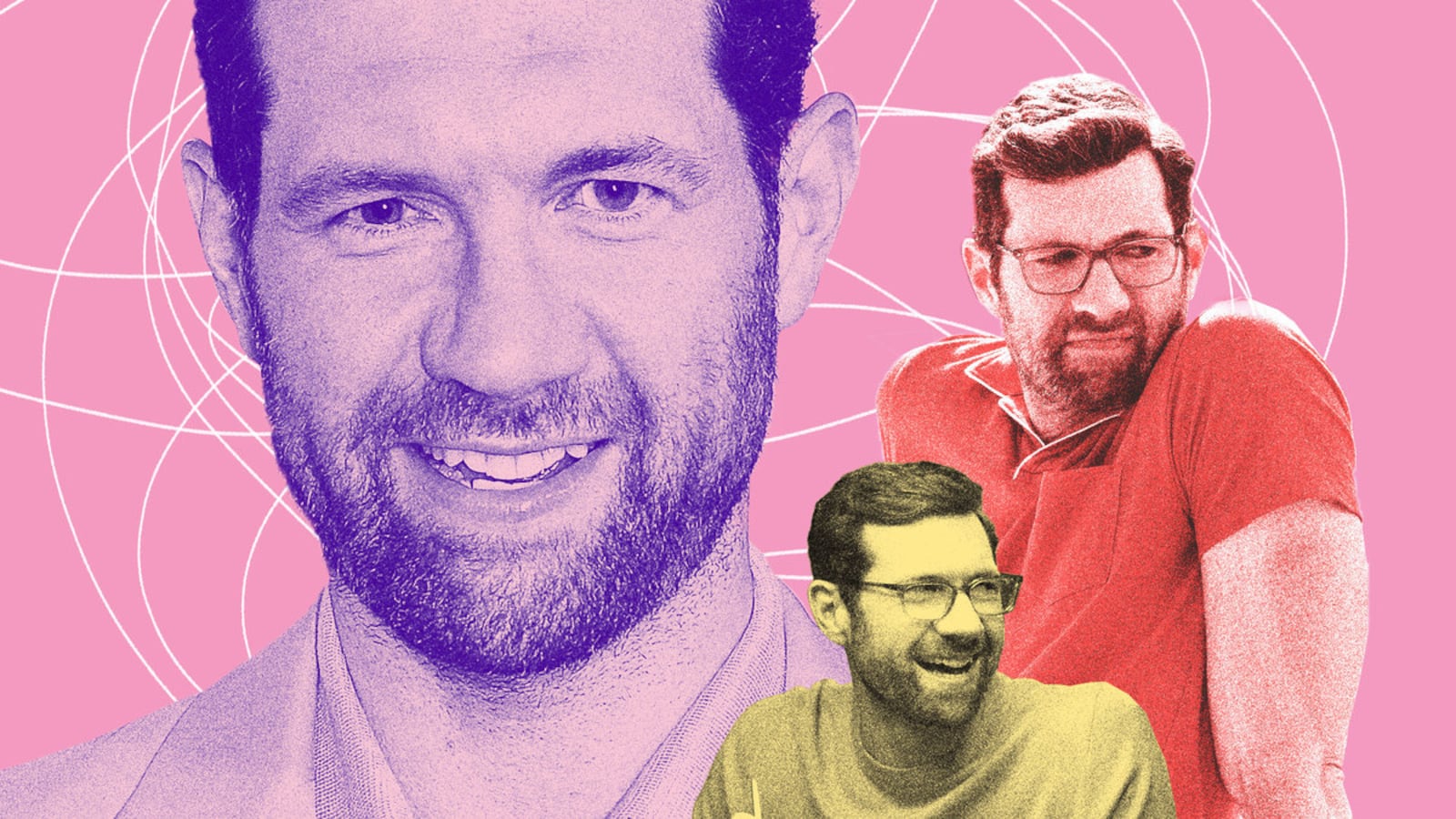Can you feel it in the air? No, not that overwhelming sense of inescapable doom—there’s a big new romantic comedy in theaters near you! Not just any rom-com, mind you, but a really, really gay one. As the (admittedly self-righteous) marketing campaign has made clear, Bros is an event: It stars an out gay man (Billy Eichner) in a major studio film about out LGBTQ+ people.
It’s a pretty big deal, and I’m thrilled to say that Bros smashes it out of the park. (A sports reference in a piece about gay cinema? Jail.) It delivers a heartwarming, hilarious, and insightful look at modern homosexuals. In fact, there’s something particularly special about Bros that sets it apart from its contemporaries. Bros is a film that recognizes something no other will: We gays can be really annoying.
Before you gather your pitchforks, think of how we normally see gay men in movies. We’re often on the sidelines, cheering on our best Judys, offering snarky bits of wisdom and shady one-liners that do absolutely nothing to develop who we actually are, besides some creepy straight-woman fantasy—or, heaven forbid, a straight-male ideal. Gay characters in rom-coms, especially, are purely sidekick material. We seem oh-so-sweet and adorable, very much designed to encapsulate the idea of the gay best friend.
Importantly, when we are given the starring role, it’s usually tinged with fear and trauma. Characters are burdened by thoughts like, “Will I be abandoned by the ones I love for coming out?” and, “Will I get beaten to death for loving and living authentically?” Don’t get me wrong: These are legitimate concerns. But there comes a point when queer audiences long for something more, something richer, and something more fun.
In Bros, directed by comedy veteran Nicholas Stoller and co-written by Stoller and Eichner, our protagonist Bobby (Eichner) is 40 years old. And, my word, is Bobby obnoxious. He's extremely self-righteous, hosts a super-successful podcast that explores previously unspoken LGBTQ history, and he also wrote a series of (less-successful) children’s books. Bobby is currently working on the opening of a completely queer museum, the first of its kind. He’s also never been in a relationship, which he’s totally fine with. This is a man who can’t seem to make up his mind about anything beyond his work, which has led to some gaping holes in his personal life.

While other rom-coms obsess over making their protagonists lovable, Bros is more invested in making its characters feel real. Bobby, like many of the gays in Bros, is messy, complicated, loud, frustrated, and, above all, annoying.
It’s a perfect role for Eichner, whose persona on shows like Billy on the Street and Difficult People is a shouty, deliberately abrasive dude. Bros takes things a crucial step further. It doesn’t just showcase some annoying gays—it explores why we are the way that we are. And yes, obviously there’s a lot more to being gay than being annoying, but it can be a big part of who we are. I think that’s beautiful, and so does Bros.
Instead of indulging in this fear of chafing the audience, Bros uses that reticence to its advantage. Bobby can be unpleasant, wielding his knowledge like a knife, cutting down anyone else who doesn’t match his own intellect. He also prefers to shout instead of converse, always needing to prove he’s right. Bobby spends his nights at the club slyly insulting other gays, who seem to be having more fun than he is. These traits are not exactly a recipe for the year’s most lovable character, but they come from a place of truth.
Through the boisterous know-it-all Bobby, Bros explores the internalized homophobia and inner turmoil that comes with being gay. Bobby is dedicated to unearthing queer history precisely because society has worked overtime to wipe it out. You’ll see pundits complain regularly that things have gone “too far,” and that the mythical “woke liberal agenda” has taken over. As queers, we know what this is code for: We’re too much, and we need to head back into the closet…or else.
The constant awareness of being “too much” has manifested within us to such a powerful degree that for many, leaning into that label is the only way to cope. Combating the negativity is to embrace and embody it—to be bigger, bolder, louder, and yes, more annoying than ever before. It feels like our current place in society is always at risk, and the only way to assure our space in the world is to stand out.

Saying that, Bros is not a film weighed down by the fear of coming out or being killed for living authentically. This is an exceptionally joyful film, where gays are allowed to be entire people—messy, complicated, even unlikable people. And it has an acute understanding of queer history—not just in the plot about building an LGBTQ museum, but also in the handling of its characters, especially Bobby.
Bros removes the boxes into which other films force whatever queer characters they may have—which is usually a minuscule number in the first place. By showcasing the full breadth of our personalities, this movie creates an unabashed, authentic portrayal of us. This is a movie that makes its point loudly and proudly: We’re here, we’re queer, we’re annoying, and we’re not shutting up any time soon.






